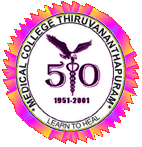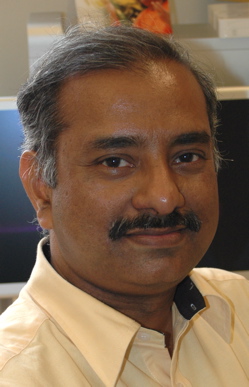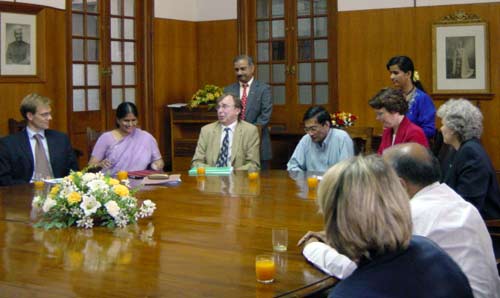SWEDISH SOUTH ASIAN STUDIES NETWORK
Center for Molecular Medicine, Karolinska Institutet Medical University, Stockholm:
Other departments/units at Karolinska Institutet Medical UniversityKI’s India Programme |
Postal address: Centrum för Molekylär
Medicin, SE-171 76 Stockholm, Sweden
Visiting address: CMM, KS-ringen 6, Karolinska Hospital,
Solna
Fax: +46 (0)8 517 761 80
Web page: http://www.cmm.ki.se/
The Center for Molecular Medicine (CMM) was initiated in 1977, and has been financed for the most part by donations. CMM gathers clinical and experimental. expertise from Karolinska University Hospital and Karolinska Institutet. It consists of several research units, out of which some are working on South Asia related projects.
South Asia related research at CMM:
|
Gastroenterology and Hepatology Unit:
Contact person: Professor Rolf Hultcrantz
 Prof. Hultcrantz has a collaboration
with Professor K.T. Shenoy at the Thiruvananthapuram Medical
College,
Kerala, India. In November 2004 they received a three-years (2005-07)
grant from the Swedish
Research Links programme for a project called ”Nonalcoholic
fatty liver as a risk factor for the development of chronic liver disease
and hepatocellular”.
It is a
study about the effect of fatty liver and insulin resistance on chronic
liver diseases and hepatocellular carcinoma.
Prof. Hultcrantz has a collaboration
with Professor K.T. Shenoy at the Thiruvananthapuram Medical
College,
Kerala, India. In November 2004 they received a three-years (2005-07)
grant from the Swedish
Research Links programme for a project called ”Nonalcoholic
fatty liver as a risk factor for the development of chronic liver disease
and hepatocellular”.
It is a
study about the effect of fatty liver and insulin resistance on chronic
liver diseases and hepatocellular carcinoma.
Aims behind project: To study the impact
of fatty liver on chronic liver disease (CLD) and Hepatocellular carcinoma
(HCC) in two different areas with high (Kerala) and normal frequency
of diabetes mellitus Type II. Workplan: Patients with CLD and HCC will
be compared. Fatty liver will be quantified with ultrasound. Alcohol
use, HBV, HCV HFE mutations will be determined. Lipid and glucose metabolism
will be investigated as well as genes and gene families responsible for
defence against oxidative stress. In patients with HBV induced HCC, HBV
genotypes and polymorphims in the precore region will be investigated.
Importance: This study will be important to show the impact of metabolic
syndrome and fatty liver on the development of CLD and HCC. Mode of cooperation:
Patients will be identified in Kerala and Sweden. Analysis of blood and
sera will be analysed in Sweden by Swedish and Indian researchers.
Molecular Immunogenetics Unit:
Contact person: Associate Professor Carani B. Sanjeevi, phone: +46 (0)8 517 76 254
 Dr.
C B Sanjeevi (photo to the left)
is Group leader for the Molecular Immunogenetics lab. The group focuses
its research on Type 1 diabetes, an autoimmune disease with strong genetic
basis (its incidence in Sweden is one of the highest in the world). The
group’s main interest lies in the understanding of the immunogenetic
factors, especially its structural and functional aspects of these genes,
in the understanding of the etiology of the disease and finding ways to
predict the disease and possibly to prevent the disease.
Dr.
C B Sanjeevi (photo to the left)
is Group leader for the Molecular Immunogenetics lab. The group focuses
its research on Type 1 diabetes, an autoimmune disease with strong genetic
basis (its incidence in Sweden is one of the highest in the world). The
group’s main interest lies in the understanding of the immunogenetic
factors, especially its structural and functional aspects of these genes,
in the understanding of the etiology of the disease and finding ways to
predict the disease and possibly to prevent the disease.
More
information on the Molecular Immunogenetics Research Group.
Dr. Sanjeevi is running a Type
1 Diabetes network in India. The activity is coordinated by the Cuttack
Diabetes Research Foundation in Cuttack, Orissa, and included holding of
the so-called 1st Karolinska Symposium on Current Problems in Diabetes
2006 (CPID) in Bhubaneswar, Orissa 9–11 January 2006.
In October 2006, Dr. Sanjeevi
received a SEK 600 000 as a grant from the Swedish Research Links programme
(funded by Sida and the Swedish Research Council) for a research
project titled ”Genetic and immunological
aspects of diabetes development and the mechanism of protection in young-onset
diabetes and malnutrition modulated diabetes in India”.
The project will be carried out in collaboration with Dr. Alok
Kanungo at Cuttack Diabetes Research
Foundation. More information
about the project, with an abstract.
From January 2005 Dr. Sanjeevi was appointed as a member of the Editorial board of HUMAN IMMUNOLOGY, and he is also appointed to the International Advisory Board of the Journal of Association of Physicians of India (JAPI) from January 2005. Besides Sanjeevi is an associate editor for DIABETOLOGIA (published by EASD), member of the Editorial Board of 'Current Diabetes Reviews' from USA and Editor for the 'IMMUNOLOGY OF DIABETES' series published by the Annals of the New York Academy of Sciences (USA).
Karolinska Institutet’s India program
Dr. Carani Sanjeevi is also
Karolinska Institutet's Representative for India, and acts as coordinator
for the Linnaeus-Palme
Programme in Medicine for India at KI. Go
for Karolinska Institutet’s Internet Gateway ”Go Asia”,
giving information on the India related activities at KI. He
has been instrumental in developing the long-standing relations between
Karolinska Institutet and the Medical College in Thiruvavanthapuram
(Trivandrum) in Kerala, founded in 1951 and with the Swedish professor
Axel Höjer as its first Principal.
Karolinska Institutet Medical
University is now involved in a Linnaeus Palme exchange programme with
the Trivandrum Medical College (TMC) in Thiruvananthapuram. A reciprocal
exchange of students and teachers are taking place every year between
the two institutions. The exchange involves both the Medical
doctors training,
and the midwifery training at the Division
for Reproductive and Perinatal Health/Department of Woman and Child Health.
Coordinator for the Linnaeus-Palme program at TMC is Professor B.
Jayakumar.
The collaboration was further stabilised after a meeting between representatives
of KI, including Dr. Sanjeevi, and the Chief Minister of Kerala in November 2004.
It was then proposed that KI doctors should be sent for clinical courses/workshops
and conduct the clinical part of KI’s postgraduate courses in TMC. A new
International Office in TMC will coordinate these activities as a single window
clearance system.
Since the start in 2001/02, 6 students from Karolinska Institutet have
gone to TMC, and seven students the opposite way. 6 techers from KI and
9 techers from TMC have also been involved in the exvchange programme.
From 2007/08, discussions are also under way to open up a similar collaboration
with Vellore Christian College in Andhra Pradesh.
Information about the Linnaeus Palme grants 2007,
given by Swedish International Programme Office for Education and Training
(Internationella programkontoret).
In November 2002 KI organized a research symposium on Diabetes mellitus at the Trivandrum Medical College, in association with the state government of Kerala. This symposium was intended to develop collaboration in research and post-graduate education between the two institutions subsequent to the signing of a Memorandum of Understanding in December 2001 under the Linnaeus-Palme programme. The symposium was organized by Dr. Sanjeevi with support from a joint committee. From KI professors Claes-Goran Östenson, Gunnar Norstedt, Hans Gustaf Ljunggren, Bo Lindblad, Md. Shahidul Islam and Akhtar Khan also participated. It resulted in exchange of ideas and initiation of collaboration in areas of diabetes research and infectious diseases, and several funding areas were identified that could be applied for, to support research and exchange of students for Masters Programmes. Karolinska Institute would also help in developing telemedicine capability for exchange of ideas between the two institutions.
 |
| Signing of the MoU between KI and IISc. From left to right: Mr.Anders Sjöberg from the Swedish embassy in New Delhi, the Registrar of IISc, Prof.Hans Wigzell (former president of KI), the Director of IISc, Harriet Wallberg Henriksson (President of KI) and Inga Fogh Ericsson (Sweden's ambassador to India). Dr.Sanjeevi, scientific coordinator for India at KI, is seen standing behind Prof.Hans Wigzell. |
In the first week of March 2006,
a delegation from Karolinska Institutet Medical University went to Bangalore,
India, headed by the KI President Prof. Harriet
Wallberg Henriksson and
accompanied by Prof. Hans
Wigzell and Associate Prof. Sanjeevi.
KI had discussions with Biocon to strengthen their existing collaboration,
and signed a Memorandum of Understanding with the Indian Indian
Institute of Science (IISc) in Bangalore for cooperation in research
and education. The MoU covers sharing
of knowledge and conducting joint research on infectious diseases,
metabolic diseases and cardiovascular diseases.
The event, graced by the Swedish Ambassador to India, Ms. Inga Fogh
Ericsson, was widely covered by Indian press. See articles in Times
of India (Bangalore
edition), and The
Hindu.
KI and IISc also organized a joint 'Indo-Swedish workshop
on Innovations in Life sciences' 4–5 March 2006 on behalf of Vinnova
at the IISc campus in Bangalore. This was attended by 25 Swedish experts
and 50 Indian experts in the field of Infectious Medicine (HIV, Malaria
and Tuberculosis), Cardiovascular Medicine and Metabolic diseases.
KI's President inaugurated the workshop.
SASNET - Swedish South Asian Studies Network/Lund
University
Address: Scheelevägen 15 D, SE-223 70 Lund, Sweden
Phone: +46 46 222 73 40
Webmaster: Lars Eklund
Last updated
2010-05-21
